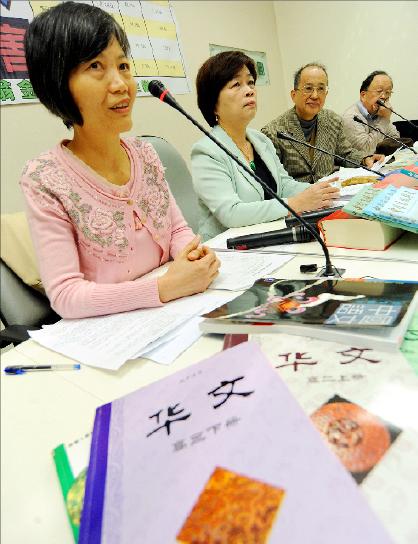A curriculum for high school students that has more emphasis on classical Chinese texts is not a good thing for either students or schools, Democratic Progressive Party Legislator Wong Chin-chu (翁金珠) said yesterday.
Wong, accompanied by Chang Jung Christian University’s Graduate Institute for Taiwan Studies visiting professor Chuang Wan-shou (莊萬壽), National Association of Parents’ Organizations chairman Hsieh Kuo-ching (謝國清) and Ministry of Education Curriculum Commission member Lin Lih-yun (林麗雲), criticized the education ministry’s recent decision to make the study of the Four Books — Great Learning (大學), Doctrine of the Mean (中庸), Analects of Confucius (論語) and Mencius (孟子), which are ancient Confucian classics written before 300BC — mandatory for high school students in an attempt to restore morality and prevent bullying.
Wong said that if the students spend so much time memorizing classical Chinese texts — which are written differently from the modern Chinese — they would not have time to study modern and world literature.

Photo: Lo Pei-der, Taipei Times
She went on to say that since President Ma Ying-jeou (馬英九) took office, classical Chinese texts have come to comprise 65 percent of the books read by high school students, compared with 45 percent before he was in office. Now that the government is further increasing the emphasis on Chinese classics by making the study of the Four Books mandatory, Wong said that it would be too much for students to handle.
Lin said the ministry increased the emphasis on Chinese classics in a curriculum submitted in September last year, after several members on the Curriculum Committee had been changed. However, the committee has now overruled the curriculum established in September and made the study of the Four Books mandatory.
“What is the basis for the change?” Lin asked.
Chuang said it doesn’t make sense to make the Four Books mandatory for high school students, considering that their study isn’t even mandatory for students at public universities.
He said that the Four Books were used as major textbooks in ancient times and contain no spirit of modernity. Therefore, he said it’s impossible to solve the problem of bullying at school by asking students to study the books.
Hsieh said that Taiwanese high school students attend school for 35 hours a week, which is much more than the 20 to 25 hour average for Western countries.
With such a harsh curriculum, Hsieh said, it would become difficult for each school to develop its own distinguishing feature.
In response, the ministry yesterday said it “humbly accepts all suggestions and criticisms and will forward the opinions to the Curriculum Committee for discussion.”

Taiwanese can file complaints with the Tourism Administration to report travel agencies if their activities caused termination of a person’s citizenship, Mainland Affairs Council Minister Chiu Chui-cheng (邱垂正) said yesterday, after a podcaster highlighted a case in which a person’s citizenship was canceled for receiving a single-use Chinese passport to enter Russia. The council is aware of incidents in which people who signed up through Chinese travel agencies for tours of Russia were told they could obtain Russian visas and fast-track border clearance, Chiu told reporters on the sidelines of an event in Taipei. However, the travel agencies actually applied

New measures aimed at making Taiwan more attractive to foreign professionals came into effect this month, the National Development Council said yesterday. Among the changes, international students at Taiwanese universities would be able to work in Taiwan without a work permit in the two years after they graduate, explainer materials provided by the council said. In addition, foreign nationals who graduated from one of the world’s top 200 universities within the past five years can also apply for a two-year open work permit. Previously, those graduates would have needed to apply for a work permit using point-based criteria or have a Taiwanese company

The Shilin District Prosecutors’ Office yesterday indicted two Taiwanese and issued a wanted notice for Pete Liu (劉作虎), founder of Shenzhen-based smartphone manufacturer OnePlus Technology Co (萬普拉斯科技), for allegedly contravening the Act Governing Relations Between the People of the Taiwan Area and the Mainland Area (臺灣地區與大陸地區人民關係條例) by poaching 70 engineers in Taiwan. Liu allegedly traveled to Taiwan at the end of 2014 and met with a Taiwanese man surnamed Lin (林) to discuss establishing a mobile software research and development (R&D) team in Taiwan, prosecutors said. Without approval from the government, Lin, following Liu’s instructions, recruited more than 70 software

BACK TO WINTER: A strong continental cold air mass would move south on Tuesday next week, bringing colder temperatures to northern and central Taiwan A tropical depression east of the Philippines could soon be upgraded to be the first tropical storm of this year, the Central Weather Administration (CWA) said yesterday, adding that the next cold air mass is forecast to arrive on Monday next week. CWA forecaster Cheng Jie-ren (鄭傑仁) said the first tropical depression of this year is over waters east of the Philippines, about 1,867km southeast of Oluanpi (鵝鑾鼻), and could strengthen into Tropical Storm Nokaen by early today. The system is moving slowly from northwest to north, and is expected to remain east of the Philippines with little chance of affecting Taiwan,